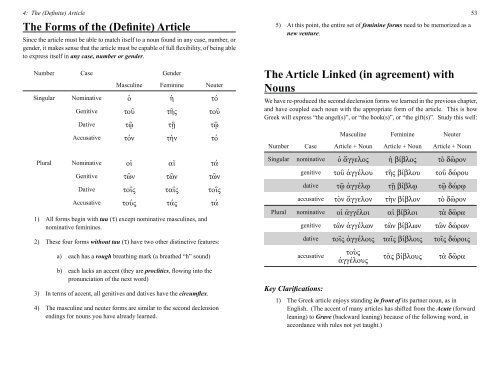Elementary New Testament Greek, 2014a
Elementary New Testament Greek, 2014a
Elementary New Testament Greek, 2014a
You also want an ePaper? Increase the reach of your titles
YUMPU automatically turns print PDFs into web optimized ePapers that Google loves.
4: The (Denite) Article<br />
The Forms of the (Denite) Article<br />
Since the article must be able to match itself to a noun found in any case, number, or<br />
gender, it makes sense that the article must be capable of full exibility, of being able<br />
to express itself in any case, number or gender.<br />
Number Case Gender<br />
Masculine Feminine Neuter<br />
Singular Nominative <br />
Genitive <br />
Dative <br />
Accusative <br />
Plural Nominative <br />
Genitive <br />
Dative <br />
Accusative <br />
1) All forms begin with tau () except nominative masculines, and<br />
nominative feminines.<br />
2) These four forms without tau () have two other distinctive features:<br />
a) each has a rough breathing mark (a breathed “h” sound)<br />
b) each lacks an accent (they are proclitics, owing into the<br />
pronunciation of the next word)<br />
3) In terms of accent, all genitives and datives have the circumex.<br />
4) The masculine and neuter forms are similar to the second declension<br />
endings for nouns you have already learned.<br />
5) At this point, the entire set of feminine forms need to be memorized as a<br />
new venture.<br />
The Article Linked (in agreement) with<br />
Nouns<br />
We have re-produced the second declension forms we learned in the previous chapter,<br />
and have coupled each noun with the appropriate form of the article. This is how<br />
<strong>Greek</strong> will express “the angel(s)”, or “the book(s)”, or “the gift(s)”. Study this well:<br />
Masculine Feminine Neuter<br />
Number Case Article + Noun Article + Noun Article + Noun<br />
Singular nominative <br />
genitive <br />
dative <br />
accusative <br />
Plural nominative <br />
genitive <br />
dative <br />
accusative<br />
Key Clarications:<br />
<br />
<br />
<br />
<br />
1) The <strong>Greek</strong> article enjoys standing in front of its partner noun, as in<br />
English. (The accent of many articles has shifted from the Acute (forward<br />
leaning) to Grave (backward leaning) because of the following word, in<br />
accordance with rules not yet taught.)<br />
53


















